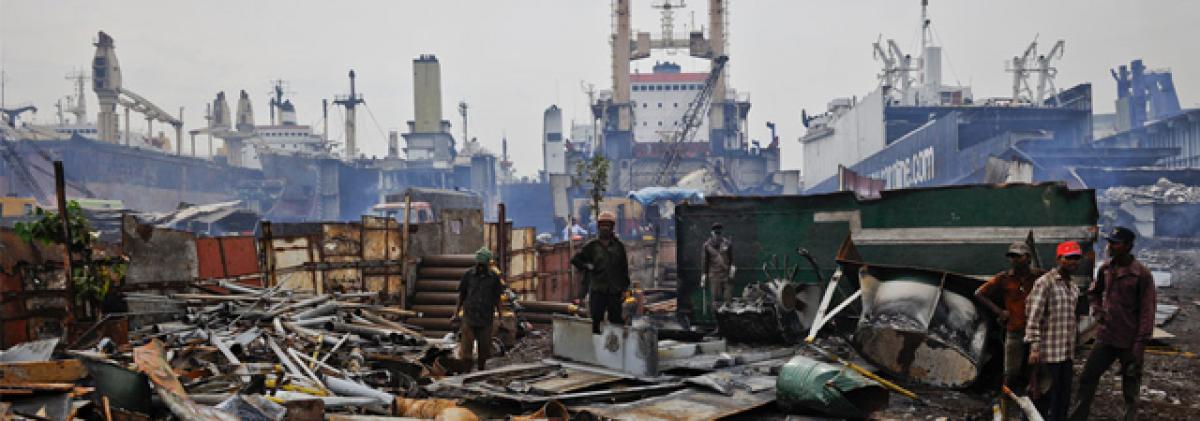Live
- ‘Get Set, Grow Summit 2024’ Focuses on Digital Detox for Families
- Stokes motivates his team to put in extra effort, says England pacer Potts
- From overcoming setbacks to leading India in U19 Women’s Asia Cup, Niki Prasad's amazing journey
- Driving Enterprise Security: Inside Venkata Reddy Thummala’s Leadership Journey
- Constitution debate: PM Modi hails 'Nari Shakti'; makes strong pitch for 'United Bharat’
- Abhijeet Bhardwaj: Revolutionizing Enterprise Analytics with Innovation and Expertise
- Bihar: Inquiry initiated against principal who went to buy veggies during school hours
- Press Sri Lankan Prez for release of Indian fishermen: TN Cong MP to EAM Jaishankar
- TN: DMK postpones executive meet due to heavy rains & Parliament session
- Porous silicon oxide electrodes can fix durability issues in batteries: Researchers
Just In

End of the line for ship graveyards. In the world\'s biggest ship recycling centre of Alang onIndia\'s Arabian Sea coast, workers with blow torches cut segments of steel stripped from the rusting hull of a towering cargo ship, sold for scrap by its Japanese owner.
In the world's biggest ship recycling centre of Alang onIndia's Arabian Sea coast, workers with blow torches cut segments of steel stripped from the rusting hull of a towering cargo ship, sold for scrap by its Japanese owner.

But in this town - located in Prime Minister Narendra Modi's home state of Gujarat - more than half of the ship-breaking yards have shut in the past two years and the future of the trade in India and neighbours Bangladesh and Pakistan is bleak.
The industry has been hit by a flood of cheap Chinese steel and new European Union environmental rules due later this year threaten to push business to more modern yards in places like China and Turkey - in turn devastating local economies.
"People are running this business from their heart, not from their mind," said Chintan Kalthia, whose company R L Kalthia Ship Breaking Pvt Ltd runs one of Alang's more modern yards. Still, he takes pride in the fact that after months of negotiations with a Japanese owner, his yard secured the biggest ship currently being recycled in Alang.
"But this is my last ship. This business is dying," he added, suddenly sounding weary, as workers outside his beach-side glass office sized slabs of steel peeled from the ship. Ships sold to South Asian breakers, which control about 70 per cent of the market, are winched at high tide onto a beach, where they are taken apart by mostly migrant labourers.
Equipment, such as radars, engines - and even tables and chairs - is taken off and sold, while the steel from the hull is removed for scrap. The trade in Alang used to employ about 60,000 directly, with thousands more in spin-off businesses, said yard owners.
With a plunge in steel prices, ship owners are getting about $3.6 million less for the 25,000 tonnes of recoverable metal from a typical iron ore or coal carrying ship than just eight months ago. The finger of blame is being pointed at China.
"China is selling below the price of recycled steel," said Amit B. Padia, owner of Sagar Laxmi Ship Breakers, as an orange crane lifted a bathroom removed from a ship onto a trailer. The situation in Pakistan appears equally bad.
"It has always been a cyclical business but people who have been in this industry tell me this is the worst in 30 years," said Shoaib Sultan, the owner of Horizon Ship Recycling in Karachi. The story in Bangladesh is similar.
Ship breakers globally bought 25.2 million deadweight tonnes (dwt) of vessels up to early July, against 33.8 million dwt all of last year, with Bangladesh the largest buyer, according to shipping services firm Clarkson. "Everyone thought prices will improve and bought a lot, but now they are sitting on huge inventories," said Islam.
"It will be a disaster in the coming months." It takes up to nine months for a typical bulk carrier in India to be broken up and its steel processed, said Rakesh Khetan, chief executive of Singapore-based Wirana Shipping Corp, a major buyer of ships for scrap.
As well as facing pressure from cheap Chinese steel, there are also calls to stop beach scrapping because of the danger and environmental damage from pollutants left to drain into the sea. Highlighting the risks, five people were killed and at least 10 injured after an explosion in a chemical tanker being dismantled in Alang last year, local media said.
Workers can also face health hazards such as lead paint and asbestos when working on ships. In a bid to allay environmental concerns, some yards in South Asia have cemented their work area to try to prevent seepage of oil or chemicals, but many lack the money to do this. (Reuters)
By Krishna N Das & Keith Wallis

© 2024 Hyderabad Media House Limited/The Hans India. All rights reserved. Powered by hocalwire.com







